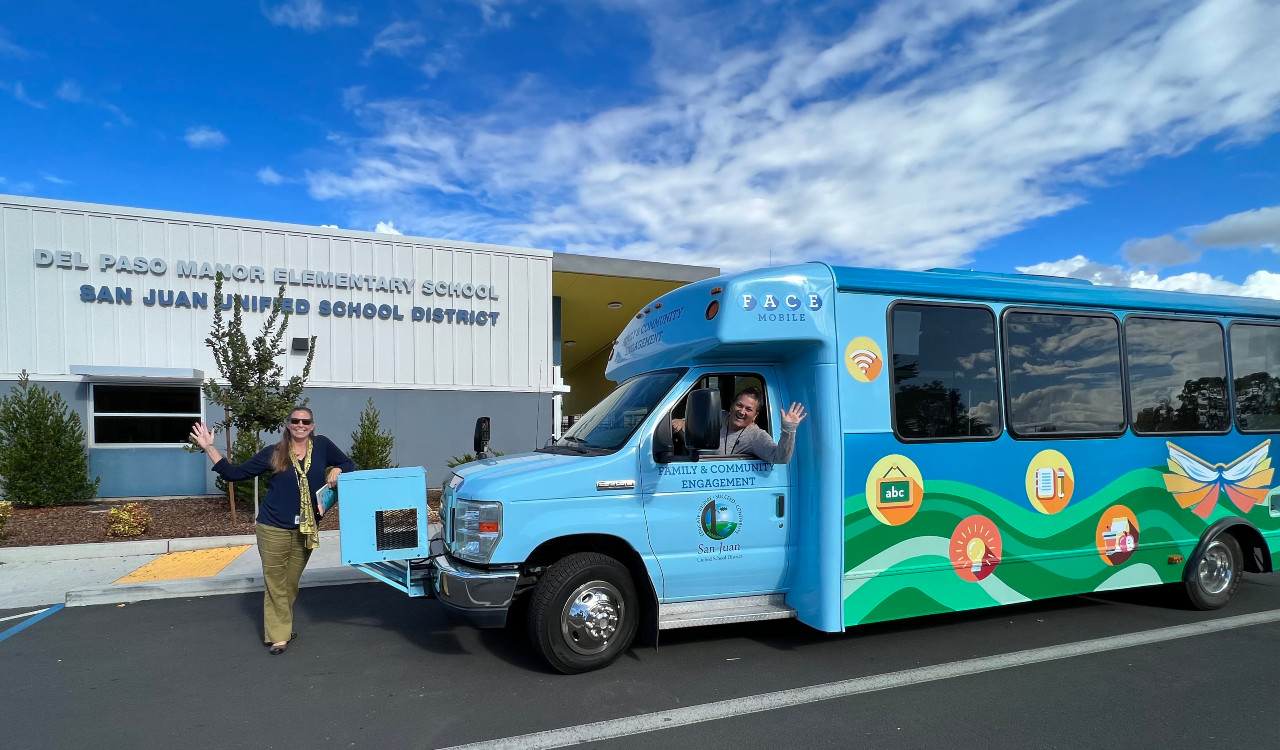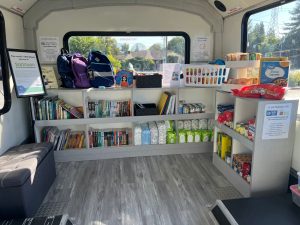The San Juan Unified School District values family and community input and goes the extra mile to ensure the district meets parents and families where they are at — quite literally, in the case of the Family & Community Engagement (FACE) Mobile resource center.
FACE Mobile launched in October 2023 after nearly a year of preparation and is designed to travel across the district to provide families with resources and support. San Juan USD families who visit FACE Mobile will receive:
- Free WiFi access
- Access to technology
- Educational resources
- District and community resource information
- Emergency food and diaper support
- Free books to encourage reading at home
- Assistance with enrollment
- District employment opportunities
- Volunteer registration and more
FACE Mobile primarily visits school sites but also visits community-gathering spots like local parks and libraries, community centers and even apartment complexes.
“The FACE Mobile visits offer a variety of resources and support for families, ranging from family education, direct technical assistance with district processes, access to community partner supports and a wide variety of tangible items for families in need to take,” said Luis Cruz Solache, San Juan USD’s family engagement coordinator. “For instance, at each visit families can expect to receive information related to district initiatives and programs, supporting learning at home or ways that they can be actively involved in the education of their children. Additionally, families can also access the FACE Mobile technology bar with iPads, computers and free WiFi for things like enrollment support, getting started on their Parent Portal, navigating the district website, signing up to volunteer, completing referrals to community resources, etc. Lastly, families can also receive tangible items such as diapers, emergency food boxes, school supplies, children’s books, clothing, hygiene supplies and backpacks.”
The response to FACE Mobile has been positive, both from the community and school staff. “The welcoming and inviting nature of each visit helps create a trusting environment for strong participation and utilization of services and supports. Hundreds of families have participated in FACE Mobile visits, and each family is able to walk away with valuable information and resources,” Solache said. “Additionally, school staff and administrators have found a lot of value in hosting FACE Mobile visits, as these visits support the relationship between home and school, as well as the building of capacity in both staff and families to be authentic partners in education.”
In addition to FACE Mobile, the district offers several informative webinars per month, addressing issues such as the budget, bullying prevention and safety, and helping students navigate state assessments. San Juan USD is also hosting a one-day conference in April titled Families Matter: Creating Summer Success. The free, family-centered event will include information and resources to help create a successful summer through workshops from community partners and district departments about the opportunities for learning. Additionally, the event hosts a summer resource fair.
Another innovative community program implemented at San Juan USD is the Neighborhood Learning Project. The initiative aims to build capacity within school communities using asset mapping to identify the strengths and opportunities that lie within their neighborhoods, then sending school staff out into their community to meet families where they’re at.
Schools can partner with places like apartment complexes, parks and recreation, community centers, businesses and organizations and provide learning opportunities through the use of make-and-take learning games, children’s books, social-emotional supports, arts and crafts and other resources to help strengthen the school-home partnership.
The Family and Community Engagement team works closely with school sites to identify locations where families experience the greatest barriers to supporting their children’s education (like chronic absenteeism, transportation issues, language barriers, homelessness). Staff then partner with district departments and community agencies who could best support addressing the specific issues.






